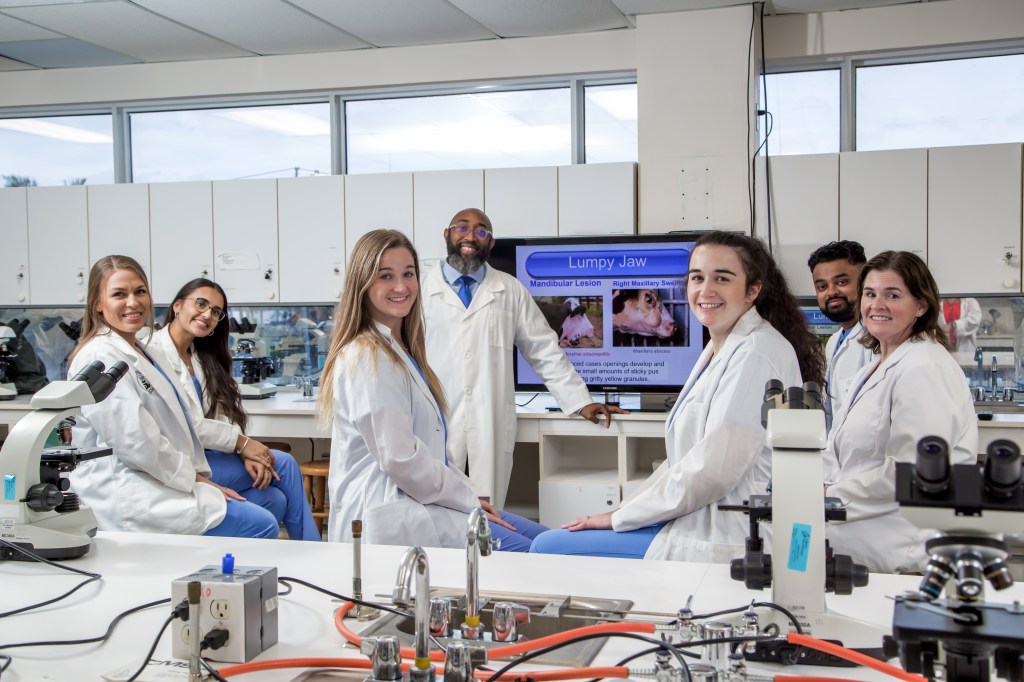
Life as a Veterinarian: What to Expect, Benefits and Challenges
Learn more about becoming a practicing veterinarian and animal care provider.
Pet owners agree that animals have their own special ways of putting a smile on their faces, and providing a sense of purpose and fulfillment. If you’re an animal lover and want to build a career around helping them, becoming a veterinarian could be the right path for you.
Importantly however, a career in veterinary medicine requires more than a love of animals. Providers need to have empathy, patience, communication skills, and a strong foundation in biological and clinical sciences to handle the diverse responsibilities that come with the job.
To help aspiring practitioners make informed choices, this guide explores what it is like to be a veterinarian, detailing a typical day, the accompanying benefits and the challenges of the profession.
A Typical Day in the Life of a Veterinarian
The veterinarian work environment is lively and fast-paced. While no two days are identical, a typical routine involves a mix of medical procedures, client interaction and administrative tasks. Understanding the daily duties of a veterinarian is key to knowing if this career is a good fit for you.
Daily Duties of a Veterinarian
So, what does a veterinarian do on a daily basis? Well, vet job duties are extensive. A typical day may include:
- Performing physical examinations and diagnosing illnesses.
- Administering vaccinations and prescribing medications.
- Conducting surgeries, from routine spays/neuters to more complex procedures.
- Interpreting diagnostic tests like X-rays and blood work.
- Dressing wounds and providing emergency care.



Veterinarian Work Environment and Hours
So, how many hours do vets work? The work schedule for a veterinarian can vary. Many veterinarians work full-time, often exceeding 40 hours a week. They may work in private clinics, animal hospitals, shelters or zoos.
It often depends on their setting; emergency vets might work overnight shifts or weekends, while those in private practice may have more standard hours, albeit with on-call responsibilities.
The work environment for a veterinarian can be both clinical and personal, requiring a balance between focused medical work and people-facing interaction.
Interactions with Animals and Clients
An important part of a day in the life of a veterinarian is communication. Vets must clearly explain complex medical conditions and treatment options to pet owners, providing reassurance and guidance during stressful times.
This client-facing aspect is as crucial as the medical expertise itself. Of course, the primary duties of a veterinarian center on the animals, from comforting a frightened pet to celebrating its recovery with the owner.
Benefits of Being a Veterinarian
There are numerous advantages of being a veterinarian that make it a highly sought-after career. For many, the pros far outweigh the cons, leading to a fulfilling professional life.
Rewarding Work with Animals
The primary motivation for most is the chance to work with animals every day. This is the cornerstone of the profession, allowing vets to advocate for and heal the animals they love.
Emotional and Professional Satisfaction
There is a profound sense of accomplishment in nursing a sick animal back to health. This emotional and professional satisfaction is a huge reason why many consider becoming a veterinarian a good career choice.
Variety in Daily Routine
As a vet, you rarely face monotony. The variety in daily routine means you might see a dog with a routine check-up, a cat with a chronic condition and an exotic bird with a unique ailment, all in one morning. This diversity keeps the work intellectually stimulating and engaging.
Development of Diagnostic Skills
Veterinarians are essentially detectives for animal health. You will continuously improve your diagnostic skills by identifying a wide range of diseases and conditions, some common and some rare, making the work mentally challenging and rewarding.
High Income Potential
Veterinarians can look forward to an attractive income potential. According to the U.S. Bureau of Labor Statistics (BLS), the median annual wage for veterinarians was $125,510 USD as of May 2024, with established vets and those with specialty certifications having the potential to earn significantly more.
Flexibility in Practice Setting
The career offers great flexibility. Beyond private clinical practice, vets can work in research, public health, agriculture or many other industries. If you own your own practice, you have even greater control over your work schedule as a veterinarian.
Challenges of Being a Veterinarian
While the career is rewarding, it’s important to be aware of the challenges. So, is being a veterinarian hard? It can be, both emotionally and physically.
Practitioners will inevitably face emotional dilemmas, particularly when making end-of-life decisions to spare an animal from suffering. These experiences can lead to “compassion fatigue.” Depending on their work setting, vets can also face physical challenges, such as working with large animals and a demanding travel schedule.
Additionally, maintaining a healthy work-life balance can be difficult, especially for practice owners who may need to work long hours and regularly be on-call.
But for those called to the profession and have a passion for animals, the rewards make the challenges well worth it!
About St. Matthew’s University School of Veterinary Medicine (SMUSVM)
SMUSVM is where future veterinarians develop their passion for animal health and commitment to care.
We proudly offer a Doctor of Veterinary Medicine (DVM) program that successful students complete in just over three years. The program provides participants with individualized support, rotation opportunities in the U.S., Canada and the U.K., and early hands-on training with small, large and more exotic animals.
To learn more, check out this testimonial alum video:
Then contact us to ask any questions or start your application today!
FAQs About Veterinarians
Achieving work-life balance can be a challenge in veterinary medicine. Long hours and emergency calls are common. However, with experience and intentional choices, many veterinarians find a good balance and develop meaningful careers.
Veterinarians manage stress through peer support, mentorship and by prioritizing self-care outside of work. Recognizing and addressing signs of burnout and compassion fatigue is important for developing a long, healthy career.
Many veterinarians cite the ability to relieve animal suffering, the bond with their patients and clients, and the intellectual puzzle of diagnosing complex cases as the most rewarding aspects of their job.
Emergencies are integrated into the schedule. Clinics often have designated emergency slots or may have a triage system to prioritize critical cases. For after-hours emergencies, many practices use an on-call rotation or refer clients to dedicated 24-hour emergency animal hospitals.